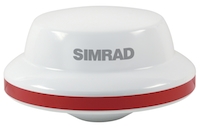Egersund, Norway – Simrad announces that its MX Series MX521B Smart Antenna, and HS80A and MX575D DGNSS compasses have been upgraded to be compatible with both global navigation satellite systems.
Two GNSS systems are currently in operation, the U.S. Global Positioning System (GPS) and the Russian Federation's Global Orbiting Navigation Satellite System (GLONASS). A space-based satellite navigation system operated by the Russian Aerospace Defense Forces, GLONASS provides additional satellite coverage to GPS. Enhancing heading and position performance, and creating redundancy in position acquisition, the updated Simrad MX521B Smart Antenna, HS80A compass and MX575D compass have increased lock-on speed and accuracy in challenging conditions, the company says.
The MX521B Smart Antenna is backward compatible with the existing MX521A Smart Antenna and is compliant with the latest IMO requirements. With the use of its built-in beacon demodulator, the MX512B provides real-time corrections to deliver highly accurate (better than 1 meter) and reliable positioning when in range of a beacon station. Simrad says. In standard GNSS mode, it provides better than 3-meter accuracy. The MX521B can also use Space-Based Augmentation Systems to provide accurate positions in areas not covered by differential GPS beacon stations.
The Simrad DGNSS compasses provide extremely accurate and reliable heading, rate of turn, and position information to Simrad autopilots, MX Series navigation systems and AIS transponders via NMEA 2000 or NMEA 0183 interfaces, the company says. The DGNSS-based Simrad MX575D compass delivers heading and DGNSS position accuracy within 0.5-degrees and sub-meter, respectively. The MX575D uses RTCM correction data supplied by its internal beacon demodulator or SBAS to achieve the high-level of accuracy, Simrad says. HS80A can use SBAS corrections to achieve DGNSS accuracy.
The MX575D and HS80A are IMO compliance certified and approved for both navigation and heading functions. In addition, both compasses include an integrated gyro and tilt sensors that Simrad says decrease start-up time and provide heading updates during any temporary loss of satellites.
“Simrad MX Series customers expect the highest level of reliability and accuracy from their navigation systems,” said Leif Ottosson, CEO of Simrad’s parent company, Navico, in a company news release. “By adding GNSS sensors to positioning systems that are already augmented with DGPS and SBAS, we are able to proudly deliver products that professional mariners can feel comfortable and confident in staking their careers and even their lives on.”





